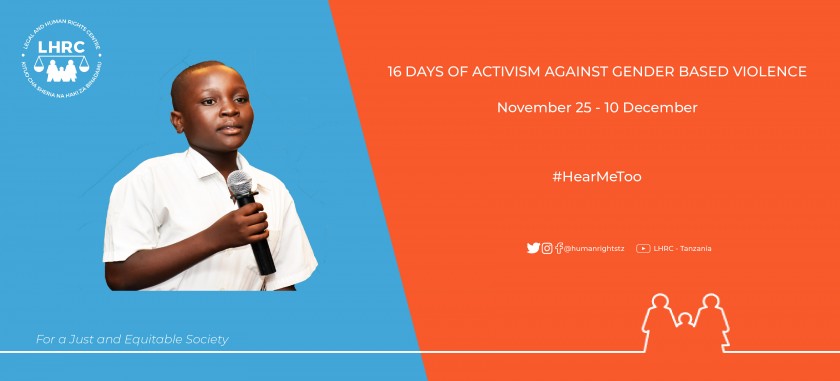
16 DAYS OF ACTIVISM AGAINST GENDER-BASED VIOLENCE “END VIOLENCE IN THE WORLD OF WORK”
In our move to advocate for the elimination of violence against women and children in Tanzania, the Legal and Human Rights Centre joins the national and international community to mark the 16 Days of Activism which is commemorated from every November 25 to 10 December since 1991. The 16 Days of Activism against Gender-Based Violence Campaign is an opportunity to galvanise the world to take action to end violence against women and girls around the world. The campaign originates from the first Women's Global Leadership Institute coordinated by the Center for Women's Global Leadership in 1991.
The 2018 campaign is marked with the theme “END GENDER-BASED VIOLENCE IN THE WORLD OF WORK” focusing on raising awareness of sextortion and sexual corruption in order to make working place a better place for women and girls. The theme also aims at sending a message to institutions where gender-based violence is perpetuated and push for systemic change and accountability. Tanzania has adopted the theme using the slogan Funguka. “Usalama Wake: Wajibu Wangu”. (Speak Up. Her Safety: My Responsibility).
In Tanzania, women and children go through various gender-based violence including discrimination and denial of access to some basic services and rights. Women face sexual, physical and psychological violence from communities they live in. Bad cultural practices and male dominance fuel violence and continue to make women one of the oppressed groups in the world.
The Tanzania Demographic and Health Survey (TDHS) 2015 - 2016 reveals that 40% of women aged 15 – 49 have experienced physical violence while 17% of them have suffered sexual violence. Presence of discriminatory laws and lack of effective and accessible justice system are other reasons that escalate violence against women.
LHRC advocates for law reforms, introduction and reform of policies and practices for an increased promotion and protection of both the rights of women and children in Tanzania. LHRC also empowers members of the community, especially women and girls, so as to break their silence and speak out about the issues affecting them, not least those related to GBV. To make sure that their rights are equitably enjoyed, LHRC further provides legal aid through court representation at the very least in parallel with the provision of psychological advice.
Despite the move by LHRC and other actors, incidents of violence against women and children are tremendously increasing. The LHRC’s Mid-Year Human Rights Report 2018 records 13,895 incidents of physical violence compared to 9,371 incidences in 2017. Incidences of sexual violence, that is rape and sodomy against both women and children are also high. A total of 1,218 women reported to have been raped in a period of January to June 2018 which makes a total of 203 women per month. Rape and sodomy against children have increased. Out of 6,376 incidents of violence against children, 2,365 were rape and 533 were sodomy.
Sextortion or sexual corruption continues to pull back women and young girls in quest of jobs. According to our Mid-Year Human Rights Report, a study conducted by Internews in 2018 reveals that ‘women who aim for media careers face rampant discrimination, lack of opportunities and demand for transactional sex.’ The study unveils that female journalists are usually asked for sexual corruption when they seek employment or/and by their story sources. Women also face sexual exploitation at workplaces, especially when they seek promotion. The study also reveals that male lecturers make sexual advances and sexually exploit female students, sometimes by giving them failing grades when they prove to be hostile to such advances.
Nevertheless, in the year 2018, harmful cultural practices including child marriage, teen pregnancies and Female Genital Mutilation continue to affect women and girls in Tanzania to a large extent. Cyberbullying is also abruptly taking its toll as another form of gender based violence in the country mostly affecting women and young women, especially celebrities, politicians and activists.
To achieve the overall aim of the 16 Days of Activism Campaign that is to end gender based violence, LHRC calls on all right holders that is individuals and communities; duty bearers including law makers and law enforcers as well stakeholders that is CSOs, development partners, media, religious institutions, academic institutions and corporates to play their active part in protection of women and children from all forms of violence. Exceptionally, LHRC urges men and boys to support women and girls and ensure their full protection.
We would also like to remind our government to consistently continue with the protection and promotion of women’s rights in the country by doing the following:
- Ensure justice for women facing gender based violence
- Ensure friendly systems for women to speak out and break the silence
- Amend the Law of Marriage Act, 1971 to protect girls from child marriages by making 18 years minimum age of marriage for both girls and boys.
- Nullify discriminative statements, for example the statement by President Magufuli banning re-entry of pregnant students into government schools.
- Amend the Education Act, 1978 which allows corporal punishments.
- Increase public awareness on the rights of women and GBV.
LHRC believes that the end to GBV will only become a reality when everyone in the community realises that protecting women, children and girls is their responsibility.
